Back in early March, I posted about creating magic systems, and said then that I expected I would post about world building at least once more over the course of the year. And so here I am, making myself a prophet (because right now making myself a profit is proving difficult [rim shot]).
I am world building again, for the first time in a while, actually. The last time I created a world whole-cloth was when I began work on the Islevale Cycle, which was several years ago. I have a completed novel that my agent and I are shopping around, but that is set in our world with only a small speculative fiction element. My other most recent work has been in the Thieftaker universe, which I developed nearly a decade ago. I’ve written a couple of Fearsson short stories, but that world even pre-dates the Thieftaker world (though the books took longer to find their way into print).
My point being that it feels a little odd to be immersed again in world building, and several times over the past few weeks I have had to remind myself of lessons I thought I had internalized long ago. So I figured I would share some of these lessons with you.
1) Begin with questions: As I said in that March post, I love world building. There is something thrilling about starting from scratch with limitless possibilities. I had forgotten, however, how overwhelming the process can feel, particularly at the outset, when ideas are amorphous and we don’t yet grasp what we need to discover about our world. And so I like to start with a series of questions, which serve to rationalize and structure my task. (This, by the way, is how I approach research as well; I see research and world building as connected parts of the same creative act.) That list of questions is long, and early on, as I learn more and more about my world, the list continues to expand, the addition of new questions outpacing my ability to answer them. Eventually, though, the questions get answered and the contours of my world — literal and figurative — come into relief.
2) Organize from the outset: I am not nearly as organized as some assume I am, or as I would like to be. Too often, my impulse is to dive into my world building and research and jot down what I find as quickly as I can. The result is haphazard to say the least. I do much better when I slow myself down from the start and make an effort to keep orderly notes. That means using Scrivener as it is meant to be used, as a catch-all for ALL world building and research. Already with this new project, I have not been as good in this regard as I would like to be. But the first step toward curing myself is recognizing that I have a problem, right? Right??
3) Consult with smart people: This new project of mine is NOT fantasy. It’s science fiction, almost space-opera-ish. I know. I can’t believe it either. But there it is. And so I know even less about my subject matter than I usually do at this stage. I have been in touch with literal rocket scientists about this stuff, and I’m learning a lot. Chances are, no matter the nature of the project we’re working on, we know someone — or we know someone who knows someone — who can help us fill in gaps in our knowledge base. Don’t be afraid to reach out to friends, or acquaintances, or even perfect strangers. The truth is, most people like to talk about the things they know, they like to help people, and they often think it’s pretty cool to learn we’re writing a book about something that fascinates them. Moreover, institutions like police departments and medical examiners offices, not to mention museums, government agencies, and scientific institutions, often have public relations offices that are there to answer our questions. Avail yourself of these resources.
4) Let your brain go wild: Plotting our books takes time and precision. It’s hard work, in part because we are forced to reign in our creative impulses a bit in order to come up with narratives that are logical, that make sense to our readers. World building is hard, too, and it also requires a certain rationality. But, as I said before, it is a time of possibility. We can choose what it means to be logical in this new setting. Decisions that will become immutable once we begin to write, remain fluid for now. This is the stage in the process when our imaginations should be most at liberty to roam. Enjoy that freedom.
5) Finally, be patient: Most of the time, I measure my work output in terms of pages and word counts. Progress is tangible and easily quantified. World building isn’t like that. At this stage of a project, I spend much of my time staring out the window, thinking, trying to come up with ideas, with names, with histories and forms of government and religions and the like. It is an amorphous, sloppy process that is nearly impossible to measure in any concrete way. This bothers me — it always has. I grow impatient. I chide myself for not “getting more done.” I have been world building for this new series for, like, two weeks, and already I’m railing at myself for not being done. Just for the sake of comparison, I took three months to research the Thieftaker books, so I need to cut myself some slack. World building is work. It might not break down into units that are easily counted and banked, but it’s work nevertheless. And if you’re like me, and you chafe at that sort of thing… Well, give yourself a break. That’s what I plan to do. Because I have a lot more world building to do.
Keep writing!









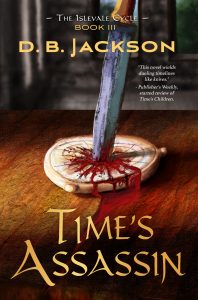 Release week continues with a special Tuesday interview post! Yes, that’s right: I am going to interview… Myself!!
Release week continues with a special Tuesday interview post! Yes, that’s right: I am going to interview… Myself!!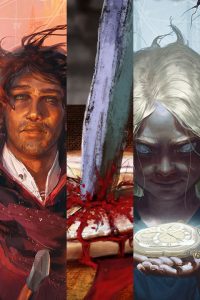 D.B.: Hubris, foolishness, self-loathing: take your pick. Time travel is so difficult. I love these books, and I’m very proud of them, but I hope never to write another time travel novel. The allure of time-travel lies in the narrative possibilities, the complications, the twists and turns. And it’s all there. But those attractions are also the biggest problems. No plot point is certain. Every event is, potentially, subject to a do-over. When we mess with time, we take away the guaranteed permanence of everything we do to and with our characters. That’s why I had to make the price of my time travel magic so steep. Because if it costs nothing to travel across time, then the time travel itself takes over the story and makes everything transitory. At least with the time travel exacting such a cost, I can limit this somewhat. And even so, once my characters made it to the past, I had to take steps to ensure that they couldn’t Walk through time again, at least for a while.
D.B.: Hubris, foolishness, self-loathing: take your pick. Time travel is so difficult. I love these books, and I’m very proud of them, but I hope never to write another time travel novel. The allure of time-travel lies in the narrative possibilities, the complications, the twists and turns. And it’s all there. But those attractions are also the biggest problems. No plot point is certain. Every event is, potentially, subject to a do-over. When we mess with time, we take away the guaranteed permanence of everything we do to and with our characters. That’s why I had to make the price of my time travel magic so steep. Because if it costs nothing to travel across time, then the time travel itself takes over the story and makes everything transitory. At least with the time travel exacting such a cost, I can limit this somewhat. And even so, once my characters made it to the past, I had to take steps to ensure that they couldn’t Walk through time again, at least for a while. I’ve just finished working on a set of three novellas set in the
I’ve just finished working on a set of three novellas set in the  Let’s start with what I mean when I speak of multiple point of view characters. This is NOT an invitation to jump willy-nilly from character to character, sharing their thoughts, emotions, and sensations. That is called head-hopping, and it is considered poor writing. Rather, writing with multiple point of view characters means telling the story with several different narrators, each given her or his own chapters or chapter-sections in which to “tell” their part of the story. When we are in a given character’s point of view, we are privy only to her thoughts and emotions. In the next chapter, we might be privy to the thoughts of someone else in the story. This is an approach used to great effect by George R.R. Martin in his Song of Ice and Fire series. Martin goes so far as to use his chapter headings to tell us who the point of view character is for that section of the story. Guy Gavriel Kay uses multiple point of view quite a bit – in Tigana, in his Fionavar Tapestry, in many of his more recent sweeping historical fantasies. I have used it in my epic fantasy series – The LonTobyn Chronicle, Winds of the Forelands, Blood of the Southlands, The Islevale Cycle.
Let’s start with what I mean when I speak of multiple point of view characters. This is NOT an invitation to jump willy-nilly from character to character, sharing their thoughts, emotions, and sensations. That is called head-hopping, and it is considered poor writing. Rather, writing with multiple point of view characters means telling the story with several different narrators, each given her or his own chapters or chapter-sections in which to “tell” their part of the story. When we are in a given character’s point of view, we are privy only to her thoughts and emotions. In the next chapter, we might be privy to the thoughts of someone else in the story. This is an approach used to great effect by George R.R. Martin in his Song of Ice and Fire series. Martin goes so far as to use his chapter headings to tell us who the point of view character is for that section of the story. Guy Gavriel Kay uses multiple point of view quite a bit – in Tigana, in his Fionavar Tapestry, in many of his more recent sweeping historical fantasies. I have used it in my epic fantasy series – The LonTobyn Chronicle, Winds of the Forelands, Blood of the Southlands, The Islevale Cycle.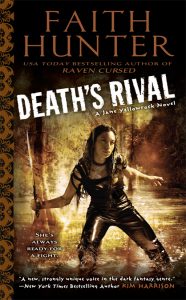 This is in contrast with single character point of view, in which we have only one point of view character for the entire story (and that point of view can be either first or third person). Think of Haith’s Yane Jellowrock series, or my Thieftaker or Justis Fearsson series, or Jim Butcher’s Harry Dresden books, or Suzanne Collins Hunger Games series, or even (for the most part) J.K. Rowling’s Harry Potter books.
This is in contrast with single character point of view, in which we have only one point of view character for the entire story (and that point of view can be either first or third person). Think of Haith’s Yane Jellowrock series, or my Thieftaker or Justis Fearsson series, or Jim Butcher’s Harry Dresden books, or Suzanne Collins Hunger Games series, or even (for the most part) J.K. Rowling’s Harry Potter books.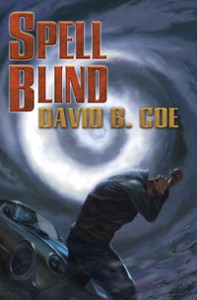 For single character point of view we have essentially two kinds of books: urban fantasies that have a mystery element, and YA novels that concentrate as much on the lead character’s emotional development as on external factors. Single character POV tends to be intimate. Readers form a powerful attachment to the narrators of these books. And, of even greater importance, readers learn things about the narrative at the same time the characters do. Even in books that begin with our narrator looking back on past events, we are soon taken back in time so that this older narrative has a sense of immediacy. This is why single character POV works so well in mysteries. The reader gets information as the “detective” does. Discovery happens in real time, as it were.
For single character point of view we have essentially two kinds of books: urban fantasies that have a mystery element, and YA novels that concentrate as much on the lead character’s emotional development as on external factors. Single character POV tends to be intimate. Readers form a powerful attachment to the narrators of these books. And, of even greater importance, readers learn things about the narrative at the same time the characters do. Even in books that begin with our narrator looking back on past events, we are soon taken back in time so that this older narrative has a sense of immediacy. This is why single character POV works so well in mysteries. The reader gets information as the “detective” does. Discovery happens in real time, as it were.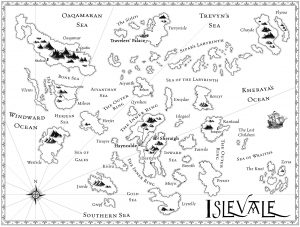 And then I just let my imagination run wild. At first I let my hand wander over the page, creating the broad outlines of my world. Sometimes I have to start over a couple of times before I come up with a design I like. But generally, I find that the less I impose pre-conceived notions on my world, the more successful my initial efforts. I draw land masses, taking care to make my shorelines realistically intricate. (Take a look at a map of the real world. Even seemingly “smooth” coastlines are actually filled with inlets, coves, islands, etc.) I put in rivers and lakes. I locate my mountain ranges, deserts, wetlands, etc.
And then I just let my imagination run wild. At first I let my hand wander over the page, creating the broad outlines of my world. Sometimes I have to start over a couple of times before I come up with a design I like. But generally, I find that the less I impose pre-conceived notions on my world, the more successful my initial efforts. I draw land masses, taking care to make my shorelines realistically intricate. (Take a look at a map of the real world. Even seemingly “smooth” coastlines are actually filled with inlets, coves, islands, etc.) I put in rivers and lakes. I locate my mountain ranges, deserts, wetlands, etc.